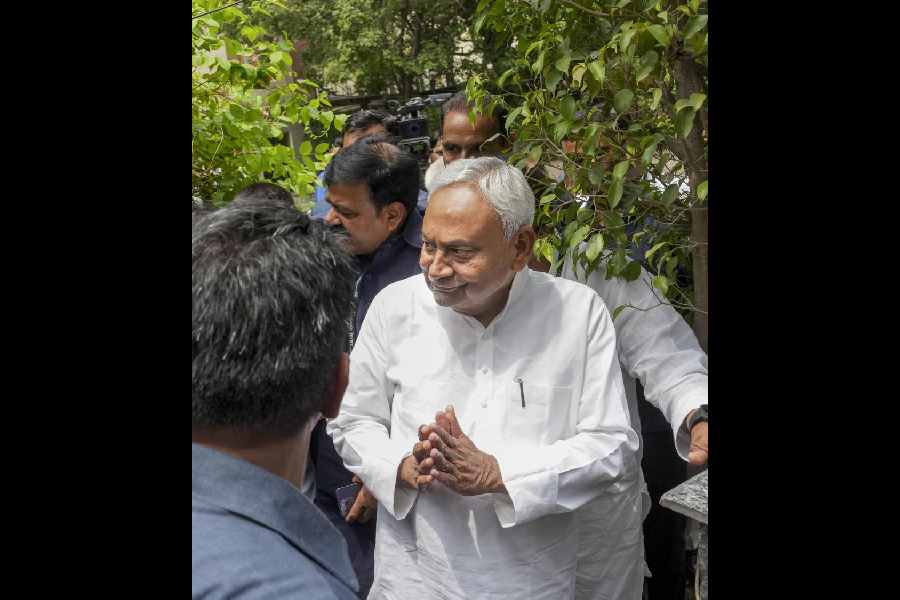Nitish Kumar’s JDU on Saturday appointed Sanjay Jha, a leader amiable to the BJP, as party working president but stepped up its demand for special status or a package for Bihar.
The party also pushed for the inclusion of the state’s 65 per cent quota legislation in the 9th Schedule of the Constitution, a demand that could put the Narendra Modi-led government in a tricky situation.
The developments transpired at the JDU’s national executive body meeting in Delhi, the first since the formation of the new NDA government at the Centre in which the JDU is a key ally.
The Nitish Kumar government had last year passed a law to increase the total quota volume in government jobs and state-run educational institutions for Dalit, backward and tribal communities from 50 per cent to 65 per cent, following a caste-based survey. Patna High Court struck this quota policy down as unconstitutional earlier this month.
The law's inclusion in the 9th Schedule would shield it from legal scrutiny, a request the Modi government and the BJP would find difficult to accommodate as it can trigger a demand for a countrywide caste census and resurrect the Mandal-politics bogey veering around reservation proportional to a caste’s population.
"Bihar wants that like Tamil Nadu (which has a 69 per cent quota volume, protected under a 1994 Act under the 9th Schedule), its new reservation law should get constitutional protection,” JDU spokesperson Rajib Ranjan told The Telegraph.
Led by the Congress, the Opposition INDIA bloc has been demanding a countrywide caste census with the slogan "jitni abadi utna haq", that is, rights based on the population share of each group. The BJP has dismissed the demand as “divisive”. As the first mover for Opposition unity, Nitish had led the countrywide caste-census pitch.
“This national executive is concerned that the new reservation law passed by the Bihar legislature based on the caste-based survey has been struck down by the Patna High Court,” the resolution passed by the JDU’s national executive said.
“This (cancellation of the law) will immediately affect the ongoing admissions in the state universities and also obstruct the state government’s promise of giving 5 lakh jobs in a year,” it said, adding that the Bihar government had decided to file a review petition in the Supreme Court.
“At the same time, this executive appeals to the government of India that in accordance with the request made by the Bihar government, the new law should be included in the 9th Schedule of the Constitution."
The meeting also reiterated Nitish’s old demand for the grant of special category status to backward Bihar.
The JDU, with 12 MPs, is the third-largest constituent of the ruling NDA after the BJP and the TDP (16 MPs) and is trying to extract a financial bonanza for Bihar by leveraging the BJP’s dependence on ally support.
Bihar goes to the polls towards the end of next year and Nitish appears to be trying to strengthen his position with the demand.
The TDP, too, wants a similar concession for Andhra Pradesh.
The resolution pitching for special status or a financial package for Bihar underlined that the JDU’s participation in the central government had increased the party’s “responsibility” and the “expectations of the people of the state”.
“In today’s situation, the need for grant of special state status to Bihar or a special (financial) package is being felt for Bihar’s development and welfare of the people,” the resolution said.
“JDU believes in the politics of coordination and assistance. The coordination and participation with the BJP is two decades old and has become synonymous with a natural alliance in the form of the NDA.”
By appointing Jha, a leader widely believed to be the key driver behind Nitish’s sudden exit from the INDIA bloc, the JDU has sought to send a message to the BJP that it is keen on better coordination but expects to retain the position of dominant partner in Bihar in return.
In terms of numbers in the Assembly, the BJP has already emerged as the dominant partner and it’s widely believed to be likely that the party would claim the chief minister’s post when the state goes to the polls.
A senior BJP leader from Bihar and former Union minister Ashwini Choubey has already let this out, saying: “The BJP will have its chief minister in 2025 and it (the party) should contest the (Assembly) elections on its own.”
Talking to reporters, JDU general secretary K.C. Tyagi claimed that Nitish had announced before the party executive that he would now remain tied to the BJP “forever”. At the same time, Tyagi asserted that “the 2025 elections would be fought under the leadership of Nitish only”.
Tyagi said Jha’s appointment would bring “more unity” in the functioning of the party.
Jha, who was with the BJP before joining the JDU in 2012, told reporters: “Bihar must get central assistance. We will pursue the demand with the central government and are hopeful it will be considered.”
How political equations between the BJP and the JDU pan out will be known closer to the Bihar polls in the seat-sharing deal.










